🐾 Paw-some Partnership Alert! 🐾
As a pack of German Shepherd enthusiasts at MixGermanShepherd.com, we're always sniffing out the best products for our furry friends. Guess what? When you fetch something from Amazon through our links, we earn a little treat! 🦴
Ensuring your German Shepherd mix puppy receives proper vaccinations is essential for their overall health. Starting the vaccination series at a young age is crucial, but have you considered the specific vaccines your puppy needs beyond the basics? Understanding the nuances of their vaccination schedule can be a key factor in keeping them protected from potential health risks.
Key Takeaways
- Core vaccinations like distemper, parvovirus, adenovirus, and rabies are essential for German Shepherd mix puppies.
- Follow a specific schedule for optimal immunity and tailored protection.
- Consult with a vet for personalized advice on vaccination plans.
- Vaccinations prevent serious diseases, ensure community health, and may be required by law.
Essential Vaccinations for German Shepherd Mix Puppies
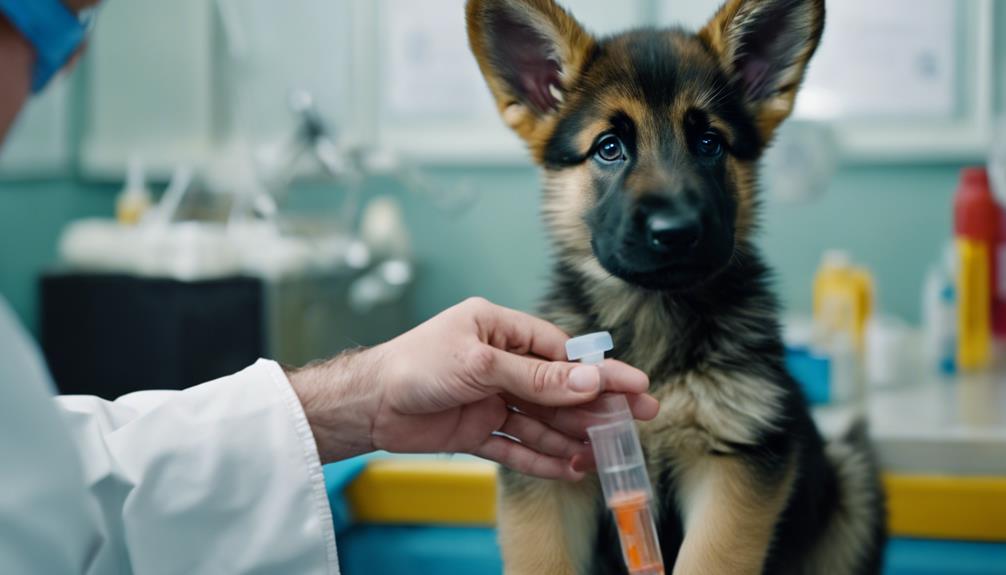
When vaccinating your German Shepherd mix puppy, ensure they receive core vaccines like distemper, parvovirus, adenovirus, and rabies for essential protection. These core vaccines are crucial in safeguarding your puppy against serious and potentially life-threatening diseases. By following a proper vaccination schedule tailored to the needs of German Shepherd mix puppies, you are taking proactive steps to ensure their long-term health and well-being.
While core vaccines are fundamental, non-core vaccines like leptospirosis and bordetella may be recommended based on your puppy's specific environment and risk factors. These additional vaccines provide extra layers of protection against diseases that your puppy may be more susceptible to based on where they live or their lifestyle.
Understanding Canine Distemper Vaccination
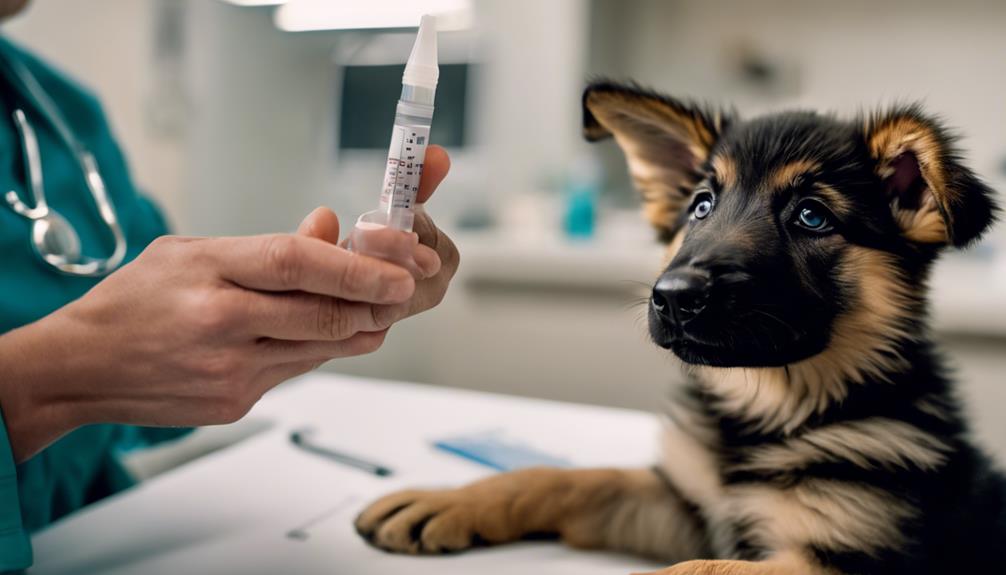
Canine distemper is a serious viral disease that affects multiple systems in dogs, making vaccination crucial for protection. Understanding the basics of distemper, the importance of vaccination, and the vaccine administration process are essential for safeguarding your German Shepherd mix puppy. By following the recommended distemper vaccination schedule, you can help ensure your puppy's health and well-being.
Canine Distemper Basics
Understanding the basics of canine distemper vaccination is essential for safeguarding your German Shepherd mix puppy's health. Canine distemper is a highly contagious viral disease that affects various systems in dogs, including respiratory, gastrointestinal, and nervous systems. Vaccination against canine distemper is a crucial step in preventing this potentially fatal disease. The distemper vaccine is typically included in the DHPP vaccine, which forms part of your puppy's vaccination schedule starting at 6-8 weeks old. By following the recommended vaccination schedule, you can help prevent your puppy from contracting this serious illness and ensure they develop the necessary immunity to fight off the virus. Vaccinating your puppy against distemper is a vital way to protect their overall well-being.
Vaccination Importance
Vaccination against distemper is an essential safeguard for the health of your German Shepherd mix puppy. Here's why it's crucial:
- Canine distemper vaccination is a core vaccination for all puppies, including German Shepherd mixes, protecting against respiratory, gastrointestinal, and nervous system issues.
- Starting the distemper vaccination series early, around 6-8 weeks old, helps establish immunity in German Shepherd mix puppies.
- Regular boosters for the distemper vaccine are vital to sustain protection throughout your puppy's life, typically requiring repeat vaccinations at 12 and 16 weeks. Proper vaccination significantly reduces the risk of your German Shepherd mix contracting and spreading this devastating virus.
Vaccine Administration Process
To ensure optimal protection for your German Shepherd mix puppy, initiating the vaccination process against distemper at 6-8 weeks old is critical. Canine distemper is a severe and potentially deadly disease affecting various systems in puppies. The distemper vaccine is typically included in the DHPP core vaccination given to puppies. Proper administration of the vaccine is crucial for developing immunity against this virus. Boosters are necessary to maintain the immunity levels over your dog's lifetime. Following the recommended vaccination schedule and ensuring your puppy receives all the necessary boosters will help protect them from this highly contagious disease. Be diligent in adhering to the vaccination guidelines to safeguard your puppy's health and well-being.
Importance of Canine Parvovirus Vaccination
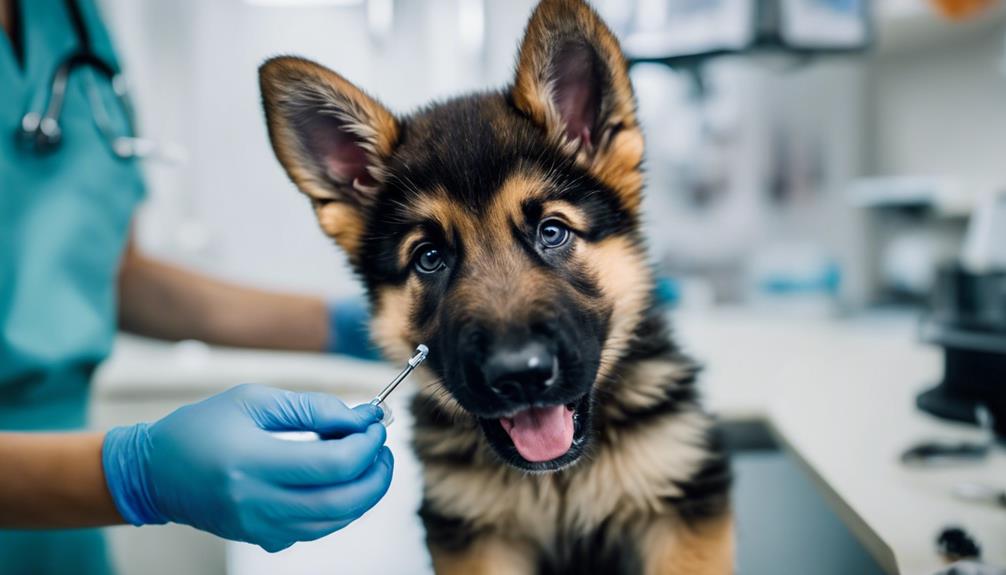
Highly contagious and potentially deadly, canine parvovirus poses a significant threat to the health of German Shepherd mix puppies, emphasizing the critical need for timely vaccination. Vaccination against canine parvovirus is crucial for puppies as it helps prevent severe symptoms like vomiting, diarrhea, and dehydration. Puppies, being more vulnerable to parvovirus, require multiple rounds of vaccinations to build immunity effectively. Canine parvovirus can survive in the environment for months, underscoring the necessity of vaccination for long-term protection. Ensuring that your German Shepherd mix puppy receives the proper vaccination against parvovirus is vital for safeguarding its health and well-being. By staying up to date with vaccinations, you not only protect your puppy but also contribute to the overall health of the canine community. Remember, prevention through vaccination is key to keeping your furry companion safe from this serious viral infection.
Timing of Canine Hepatitis Vaccination
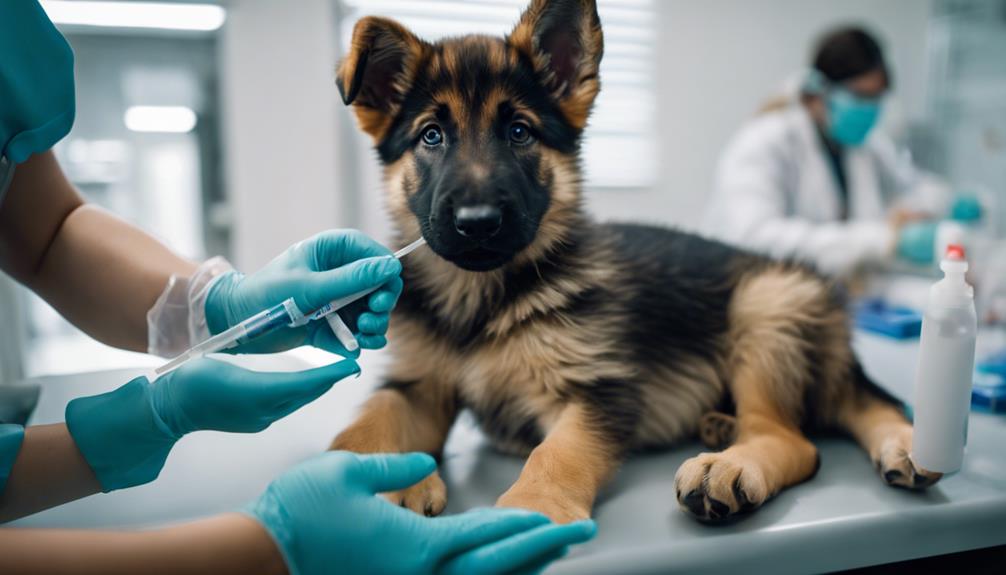
When considering the timing of Canine Hepatitis vaccination for your German Shepherd mix puppy, it is crucial to adhere to the recommended schedule. The initial dose is typically administered between 6-8 weeks of age, with additional boosters required to establish full immunity. Following the booster shot schedule is essential to ensure your puppy is protected against this viral infection affecting vital organs.
Hepatitis Vaccine Timing
For optimal protection against Canine Hepatitis, ensure that the vaccination schedule aligns with the recommended intervals for administering the vaccine to German Shepherd Mix puppies. Vaccination for Canine Hepatitis is crucial due to its highly contagious nature and its significance in maintaining liver, kidney, and eye health in puppies. To safeguard your puppy effectively, follow the suggested timeline for Canine Hepatitis vaccination. Remember that staying up to date with these vaccinations is essential for your puppy's overall health and well-being. By adhering to the vaccination schedule, you are taking proactive steps to protect your furry companion from this potentially harmful viral infection.
Age for Vaccination
Initiating vaccination against canine hepatitis for German Shepherd mix puppies is vital at 6-8 weeks as part of the DHPP core vaccine. Canine hepatitis is a highly contagious viral infection that can impact a puppy's liver, kidneys, and eyes. Ensuring timely vaccination is crucial to establish immunity early on. Check the table below for a quick overview of the age for vaccination against canine hepatitis in German Shepherd mix puppies:
| Age for Canine Hepatitis Vaccination | Description |
|---|---|
| 6-8 weeks | Initial DHPP core vaccine |
| 10-12 weeks | Booster shot |
| 1-2 years | Subsequent boosters |
| Every 1-2 years | Maintain protection |
Following a structured vaccination schedule will help safeguard your German Shepherd mix puppy against this serious disease.
Booster Shot Schedule
To ensure robust immunity against canine hepatitis, adhere diligently to the booster shot schedule for your German Shepherd mix puppy. It is crucial to follow the recommended timing for Canine Hepatitis vaccinations to provide your puppy with the best protection against this viral infection. Here is a suggested booster shot schedule:
- 6-8 weeks: Initial Canine Hepatitis vaccination.
- 10-12 weeks: First booster shot to strengthen immunity.
- 14-16 weeks: Second booster shot for continued protection.
Administering Rabies Vaccine to Puppies
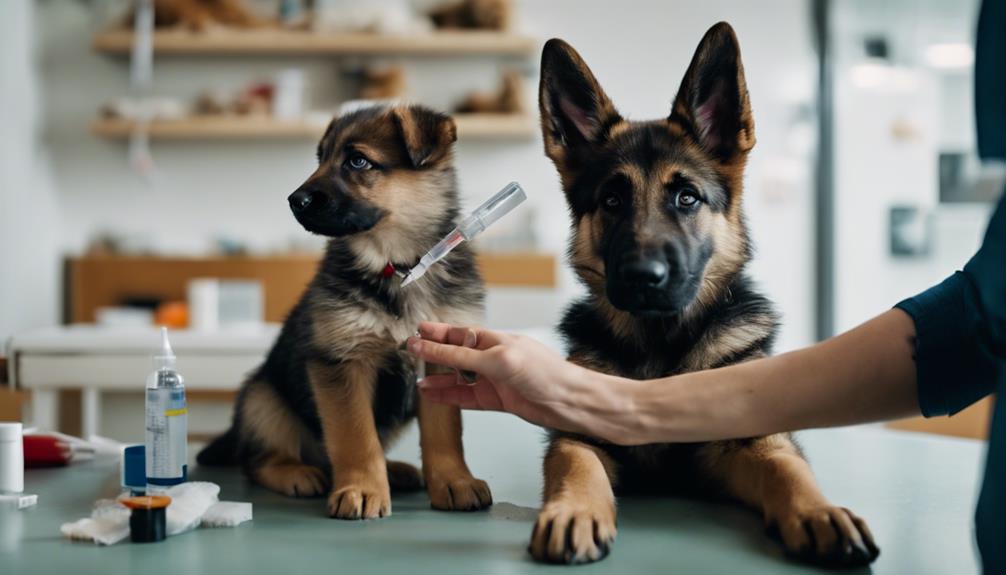
Administering the rabies vaccine to German Shepherd mix puppies is a critical step in ensuring their health and compliance with legal requirements. The rabies vaccine is not only a crucial part of the puppies' vaccination schedule but also a legal requirement in most states. Rabies, being a zoonotic disease, can pose risks to both animals and humans, highlighting the significance of timely vaccination. Puppies typically receive their first rabies vaccine between 12-16 weeks of age, with boosters needed every 1-3 years to maintain immunity. Failure to vaccinate against rabies can have severe consequences, including legal implications and public health risks. Therefore, consulting with a veterinarian is essential to guarantee the proper timing and administration of the rabies vaccine for your German Shepherd mix puppies.
| Rabies Vaccine Information | |
|---|---|
| Age to Administer | 12-16 weeks |
| Booster Frequency | Every 1-3 years |
| Legal Requirement | Yes |
| Zoonotic Disease | Yes |
| Veterinary Consultation | Recommended |
Incorporating Bordetella Bronchiseptica Vaccine
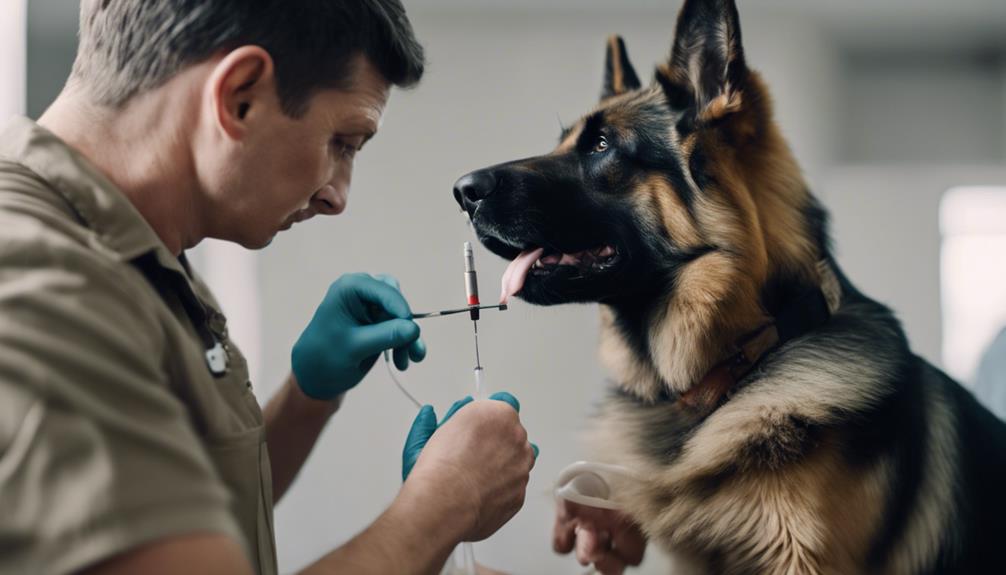
When considering the Bordetella Bronchiseptica vaccine for your German Shepherd mix puppy, it's important to understand its significance in preventing kennel cough, especially in high-risk environments like boarding facilities or dog parks. The vaccine can be administered intranasally or by injection, and its frequency may vary depending on your puppy's exposure to other dogs. Consulting with your veterinarian will help determine the necessity of the Bordetella vaccine based on your puppy's lifestyle and potential risk factors.
Importance of Bordetella Vaccine
Ensuring your German Shepherd mix puppy receives the Bordetella vaccine is crucial for safeguarding their respiratory health against kennel cough. This preventative measure protects your puppy from a highly contagious respiratory infection. Here's why the Bordetella vaccine is essential:
- Prevents Kennel Cough: Vaccination helps shield your puppy from kennel cough caused by Bordetella bronchiseptica.
- Ensures Overall Respiratory Well-being: By including the Bordetella vaccine in your puppy's vaccination schedule, you help maintain their respiratory health.
- Reduces Spread in High-Risk Environments: Especially in places like boarding facilities or dog parks where close contact with other dogs occurs, the vaccine minimizes the risk of infection transmission.
Administration and Frequency
For optimal protection against kennel cough, incorporating the Bordetella bronchiseptica vaccine into your German Shepherd mix puppy's vaccination schedule is essential. This vaccine is typically administered intranasally or orally to prevent respiratory infections caused by Bordetella bronchiseptica. The frequency of Bordetella vaccine administration can vary, but it is often recommended annually for puppies in high-risk environments. By including the Bordetella vaccine in your puppy's overall vaccination schedule, you can help safeguard them against respiratory illnesses like kennel cough. To determine the most suitable timing and frequency for administering the Bordetella vaccine to your German Shepherd mix puppy, it is crucial to consult with a veterinarian who can provide tailored guidance based on your puppy's specific needs.
Guidelines for Coronavirus Vaccination
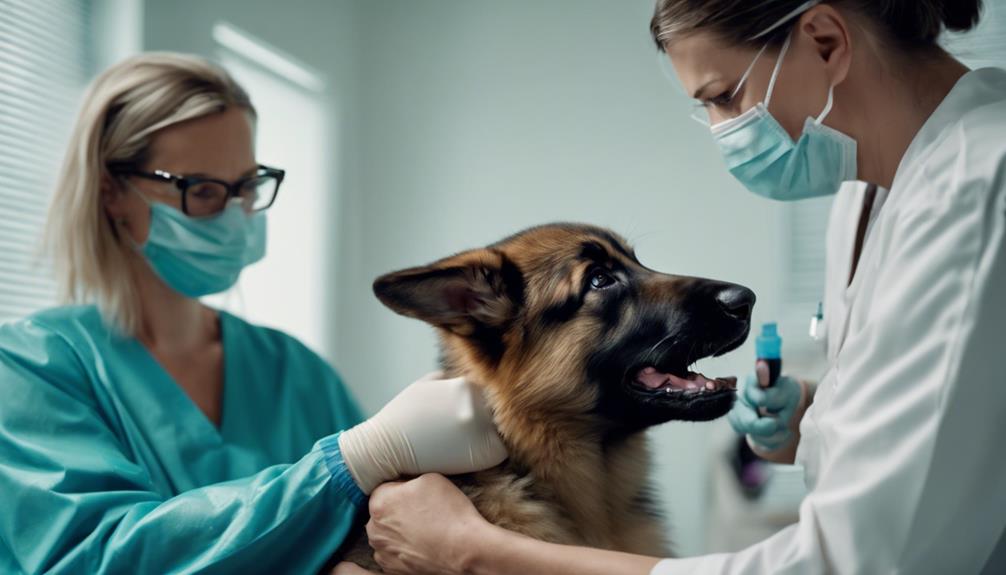
To safeguard your German Shepherd mix puppy from gastrointestinal and respiratory issues, consider the guidelines for coronavirus vaccination. The vaccine plays a crucial role in preventing infection by the canine coronavirus strain, especially in puppies exposed to high-risk environments. Here are some essential guidelines to follow:
- Consult with a Vet: Before administering any vaccines, including the coronavirus vaccine, it is imperative to consult with a veterinarian. They can provide tailored advice based on your puppy's specific needs.
- Understand the Vaccine Schedule: The vaccine schedule for canine coronavirus may vary based on various factors such as the puppy's age, health status, and risk of exposure. Your vet will guide you on the appropriate timing for vaccinations.
- Ensure Comprehensive Protection: Discussing the necessity of the coronavirus vaccine with your vet ensures your puppy receives comprehensive protection against gastrointestinal and respiratory issues associated with the virus.
Following these guidelines and collaborating with your vet will help safeguard your puppy's health and well-being effectively.
Schedule for Leptospirosis Vaccination
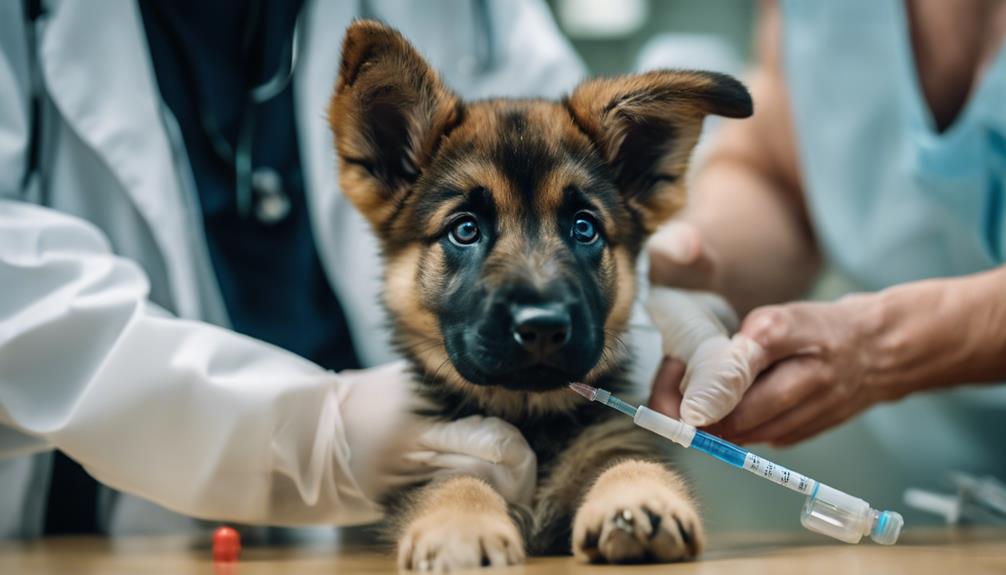
Consider the recommended schedule for administering the leptospirosis vaccine to protect your German Shepherd mix puppy against the bacterial disease. Leptospirosis is a serious bacterial disease that can be transmitted through contaminated water or soil. This vaccine is crucial for safeguarding your puppy's health as leptospirosis can lead to severe conditions like kidney and liver damage.
As part of the core vaccination schedule for German Shepherd mix puppies, the initial leptospirosis vaccine should be given. This primary vaccination helps establish immunity against the disease. However, to ensure continued protection, booster shots for leptospirosis may be necessary on an annual basis. These booster shots help maintain your puppy's immunity levels, especially considering the potential exposure to the bacteria in various environments.
Vaccinating Against Lyme Disease
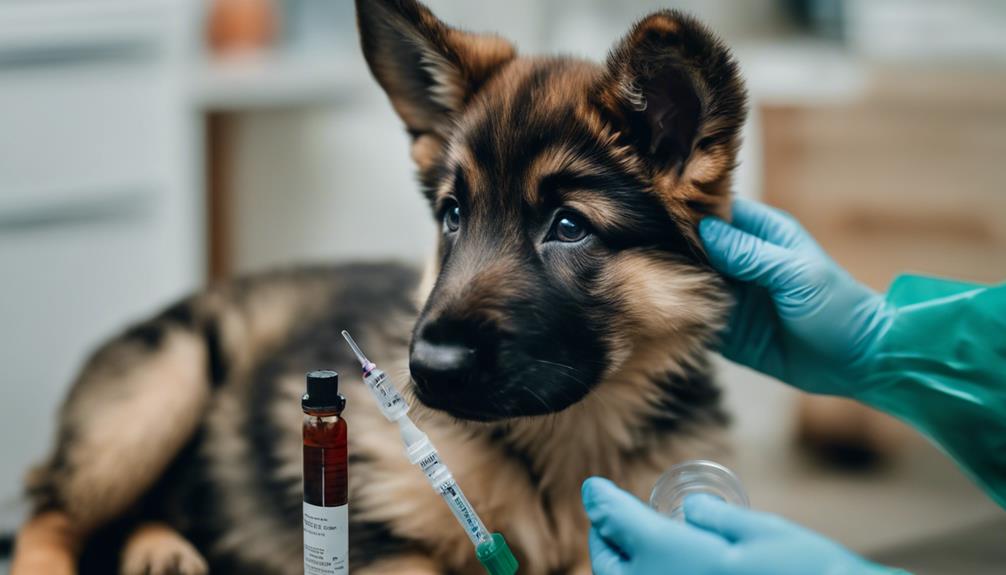
When protecting your German Shepherd mix puppy in tick-prone areas, it is essential to consider vaccinating against Lyme disease. Lyme disease vaccination is crucial for preventing the transmission of Borrelia burgdorferi bacteria carried by ticks that can lead to serious health issues in your furry companion. Here are some key points to remember:
- Lyme disease vaccination: Recommended for German Shepherd mix puppies to safeguard them from this tick-borne illness.
- Comprehensive preventive health plan: Including Lyme disease vaccination is vital for your puppy's overall well-being.
- Consultation with a veterinarian: Seek professional advice to determine the most suitable vaccination schedule and options for protecting your puppy against Lyme disease.
Protecting Puppies From Heartworm

Protect your German Shepherd mix puppy from heartworm by implementing a regular preventative medication regimen recommended by your veterinarian. Monthly preventatives such as Interceptor, Sentinel, or Iverhart are crucial in protecting your puppy from this potentially fatal disease transmitted through infected mosquitoes. These medications are especially important for German Shepherd mix puppies, as they are susceptible to heartworm infection. By administering these monthly preventatives, you can prevent heartworm disease, which can cause severe damage to your puppy's heart, lungs, and blood vessels. It is essential to prioritize heartworm prevention, as treating an infected dog is not only costly but also puts your puppy's health at risk. Consult with your veterinarian to determine the most suitable heartworm prevention regimen for your German Shepherd mix puppy.
| Medication | Administration | Age Requirement |
|---|---|---|
| Interceptor | Monthly | 6 weeks + |
| Sentinel | Monthly | 8 weeks + |
| Iverhart | Monthly | 6 weeks + |
Finalizing Puppy Vaccination Schedule
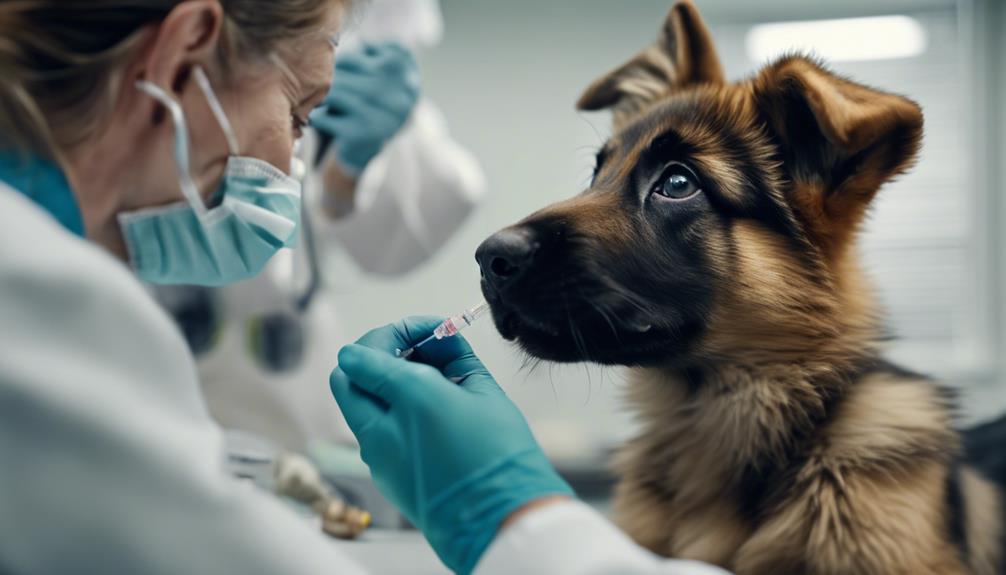
To safeguard your German Shepherd mix puppy's health and immunity, ensuring they receive their final round of core vaccinations between 14-16 weeks is vital. Consult with a veterinarian to confirm the appropriate timing for the final round of vaccinations for German Shepherd mix puppies. This step is crucial to protect your puppy from preventable diseases and maintain their overall well-being. Remember that proper vaccination scheduling plays a significant role in your puppy's long-term health.
Key Points:
- Final core vaccinations typically include distemper, hepatitis, parainfluenza, parvovirus, and rabies.
- Booster shots for core vaccines are essential for long-term immunity.
- Veterinarian consultation is necessary to determine the best vaccination schedule for your German Shepherd mix puppy.
Frequently Asked Questions
When Should German Shepherd Puppies Get Their First Shots?
When should you get your German Shepherd puppy's first shots? It's crucial to start between 6-8 weeks. These initial vaccinations safeguard against diseases like distemper and parvovirus, building immunity for your pup's well-being.
What Is the Schedule for Puppy Vaccinations?
Embrace the rhythm of health for your furry companion. Follow the beat of the vaccination schedule, harmonizing with core and non-core vaccines. Tune into booster shots for lasting protection. Your German Shepherd mix puppy's wellness symphony awaits.
Do Puppies Need 3 or 4 Sets of Shots?
For optimal vaccine effectiveness and puppy immunity, veterinarians often recommend 3 sets of shots. In high-risk environments, consider a 4th set. Vet recommendations are crucial to determine if booster shots are needed based on exposure risks and vaccine side effects.
How Much Shots Does a German Shepherd Need?
You need to ensure your German Shepherd gets the right number of shots for optimal protection. Consult your vet for tailored advice on vaccination requirements, considering breed-specific factors, immunity development, and the importance of booster shots for lasting effectiveness.
Conclusion
Just as a knight equips their armor to protect against foes, so too must you arm your German Shepherd mix puppy with the necessary vaccines to shield them from dangerous diseases. By following the proper vaccination schedule, you are ensuring your furry companion has the best chance at a healthy and happy life. Stay vigilant, stay informed, and keep your puppy safe from the unseen enemies that lurk in the shadows.
